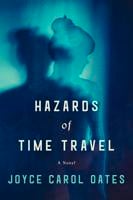Have you ever wondered why turkey vultures are bald? The answer is not pleasant. Turkey vultures feed on the viscera of dead animals, and sliding their heads into and out of carcasses ŌĆö preferably through the anus ŌĆö is easier without feathers.
Turkey vultures are scavengers; they see opportunity where others canŌĆÖt bring themselves to look.
In this they bear some resemblance to serious novelists, like Joyce Carol Oates, who, at 87, has made an astonishing career in part by turning over what others wouldnŌĆÖt touch, sliding into the darkest orifices, pushing forward until sheŌĆÖs found all the tenderest bits. Her novels can be hard to stomach, but for this she can blame reality. Some truths are revolting.
OatesŌĆÖs latest novel is ŌĆ£FoxŌĆØ (Hogarth), which begins at the Wieland Swamp in southern New Jersey, where turkey vultures circle ominously over what turns out to be a human corpse. At first, the corpse is unidentifiable ŌĆö due to ŌĆ£significant animal activity,ŌĆØ as the police chief puts it ŌĆö but is found alongside a vehicle belonging to Francis Fox, a popular new teacher at the prestigious local prep school, the Langhorne Academy.

“Fox,” by Joyce Carol Oates, Hogarth, 672 pages, $42.┬Ā
In an , Oates described the novel as a ŌĆ£classic whodunit,ŌĆØ and the unfolding of the police inquiry ŌĆö and multiple related storylines ŌĆö is mostly propulsive, despite the novelŌĆÖs 672 pages and some tiresome stylistic tics (so many words are in italics). The most impressive structural feature is the superb twist ending. This is a book that continues to change shape until the very last page.
But the novelŌĆÖs real interest lies in its anatomy of the crimes of Francis Fox ŌĆö a predator, as his name implies, who preys on his middle-school students ŌĆö and the institutions and norms that make his behaviour possible. Oates does not seek out the origins of his conduct in some childhood trauma or ŌĆö as in the case of ŌĆ£LolitaŌĆØŌĆÖs Humbert Humbert ŌĆö a thwarted erotic encounter, but in FoxŌĆÖs own sense of superiority. Fox is the product of a partial Ivy League education ŌĆö he was ejected from a Columbia PhD program for plagiarism ŌĆö and the heir to a Romantic tradition that insists on the individualŌĆÖs right to transgress convention in pursuit of his own personal ideal of beauty.
Fox quotes Blake and Thoreau as his grandiloquent authorities ŌĆö ŌĆ£God himself culminates in the present moment, and will never be more divine in the lapse of all the agesŌĆØ ŌĆö as he flatters himself that his obsession with prepubescent girls is a sign of esthetic refinement.
Fox keeps a bust of Edgar Allan Poe ŌĆö who married his 13-year-old cousin, Virginia ŌĆö on his desk, and fills his apartment with the paintings of the controversial French Polish painter Balthus, best known for his prurient portraits of very young female models. In this way, OatesŌĆÖs analysis of child abuse goes beyond the psychology of the criminal to indict American society, where every educated child is expected to know PoeŌĆÖs poems and where BalthusŌĆÖs portraits hang in the Met.
On a more immediate level, the adult characters in ŌĆ£FoxŌĆØ are guilty of extreme neglect.
In the same interview with People, Oates described Fox as a ŌĆ£charming con man,ŌĆØ but the novel has no sympathy for the adults who let themselves be conned. Teachers on hiring committees neglect to look into FoxŌĆÖs past, though several red flags call out for closer scrutiny. Later, rather than raising alarm bells, the attention Fox receives from his female students elicits jealousy from his petty colleagues. Parents, too, are fooled by Fox, and lulled into a moral stupor by their reluctance to believe the worst.
Even those who harbour suspicions prove unwilling to jeopardize their professional status by levelling accusations against a teacher who has made himself a favourite of the headmistress.
One of the few adult characters to see through Francis Fox is a lawyer Fox hires to help him through his first scandal with a student. (Fox tries to quote Kierkegaard to the lawyer: ŌĆ£The crowd is a lie ŌĆ” The individual is the highest truth.ŌĆØ) The lawyer has nothing but contempt for Fox, but professional pride makes him pursue the best possible settlement for his client ŌĆö an outcome that all but ensures that Fox will be able to continue teaching.
How did things get so bad? The novel hints that the communityŌĆÖs (almost complete) failure to stop Fox has something to do with the fragmentation of the community itself.
The rich and the poor of ŌĆ£FoxŌĆØŌĆÖs Atlantic County have almost nothing to do with each other. Instead, the locals ŌĆö ŌĆ£poor whites,ŌĆØ ŌĆ£old families that have failed to thrive in the twenty-first century, left behind by the computerized, high-tech economyŌĆØ ŌĆö are filled with resentment for the smug nouveau riche who try to ignore them while enjoying a much more comfortable existence, one they seek to make hereditary by sending their children to Langhorne and onward to the Ivy League.
Political scientists like Katherine Cramer have been warning of the growing rents in the American social fabric caused by the increasing distance between the well-off and the hard-done-by. As Cramer and her co-author put it in a recent piece in , ŌĆ£Constitutional democracy flourishes when people feel common purpose with one another, and it is impossible for people who never come into contact to build that common purpose.ŌĆØ
The institutions depicted by Oates serve not to advance a common purpose ŌĆö or enforce a shared morality ŌĆö but to prop up the strivers while grinding down the rest.
This is an unflattering portrait, but not a hopeless one. Over a long and illustrious career ŌĆö including a National Book Award for Fiction (1970), a National Humanities Medal (2010) and a ŌĆ£by the same authorŌĆØ page in ŌĆ£FoxŌĆØ that looks like the sides of the Stanley Cup ŌĆö Oates has sometimes been accused of trafficking in moral turpitude for its own sake.
A claimed that ŌĆ£Ms. Oates ŌĆ” is as cavalierly cynical as a teenager. Her stock in trade is precisely not to be shocked, and she pretends to be equally, mildly, analytically interested in all forms of human behaviour, however grotesque.ŌĆØ But ŌĆ£FoxŌĆØ reads more like a quiet jeremiad against complacency and hypocrisy, masquerading as a coolly analytic murder mystery.
In a Oates claimed that the serious writer must recognize that his or her destiny is inescapably ŌĆ£part of the nationŌĆÖs spiritual condition.ŌĆØ More than 50 years later, Oates has become an integral part of her nationŌĆÖs spiritual condition, circling its revolting truths as the tireless turkey vulture circles a kill. A weak stomach is no excuse for looking away.
































To join the conversation set a first and last name in your user profile.
Sign in or register for free to join the Conversation